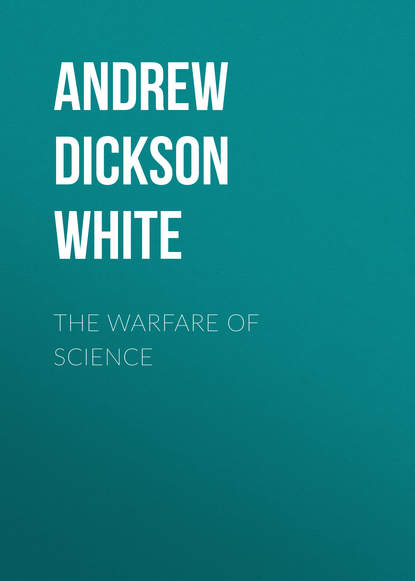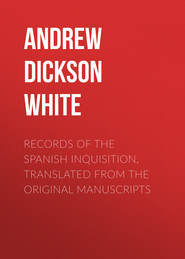По всем вопросам обращайтесь на: info@litportal.ru
(©) 2003-2025.
✖
The Warfare of Science
Настройки чтения
Размер шрифта
Высота строк
Поля
See Michaelis, Commentaries on the Laws of Moses, 1874, vol. ii., p. 3. The writer of the present article himself witnessed the reluctance of a very conscientious man to answer the questions of a census marshal, Mr. Lewis Hawley, of Syracuse, N. Y., and this reluctance was based upon the reasons assigned in II. Samuel chapter xxiv. 1, and I. Chronicles, chapter xxi. 1, for the numbering of the children of Israel.
153
See De Morgan, Paradoxes, pp. 214-220.
154
For Dupanloup, Lettre à un Cardinal, see the Revue de Thérapeutique, 1868, p. 221.
155
For general account of the Vulpian and See matter, see Revue des Deux Mondes, 31 Mai, 1868. Chronique de la Quinzaine, pp. 763-765. As to the result on popular thought, may be noted the following comment on the affair by the Revue, which is as free as possible from anything like rabid anti-ecclesiastical ideas: "Elle a été vraiment curieuse, instructive, assez triste et même un peu amusante." For Wurtz's statement, see Revue de Thérapeutique for 1868, p. 303.
156
De Morgan, Paradoxes, pp. 421-428; also, Daubeny's Essays.
157
See the Berlin newspapers for the summer of 1868, especially Kladderadatsch.
158
In the Church Journal, New York, May 28, 1874, a reviewer, praising Rev. Dr. Hodge's book against Darwinism, says: "Darwinism—whether Darwin knows it or not; whether the clergy, who are half prepared to accept it in blind fright as 'science,' know it or not—is a denial of every article of the Christian faith. It is supreme folly to talk as some do about accommodating Christianity to Darwinism. Either those who so talk do not understand Christianity, or they do not understand Darwinism. If we have all, men and monkeys, women and baboons, oysters and eagles, all 'developed' from an original monad and germ, then St. Paul's grand deliverance—'All flesh is not the same flesh. There is one kind of flesh of men, another of beasts, another of fishes, and another of birds. There are bodies celestial and bodies terrestrial'—may be still very grand in our funeral-service, but very untrue to fact." This is the same dangerous line of argument which Caccini indulged in in Galileo's time. Dangerous, for suppose "Darwinism" be proved true! For a soothing potion by a skillful hand, see Whewell on the consistency of evolution doctrines with teleological ideas; also, Rev. Samuel Houghton, F. R. S., Principles of Animal Mechanics, London, 1873, preface, and page 156, for some interesting ideas on teleological evolution.
159
For some excellent remarks on the futility of such attempts and outcries, see the Rev. Dr. Deems, in Popular Science Monthly for February, 1876. To all who are inclined to draw scientific conclusions from Biblical texts, may be commended the advice of a good old German divine of the Reformation period: "Seeking the milk of the Word, do not press the teats of Holy Writ too hard."
160
In an eloquent sermon, preached in March, 1874, Bishop Cummins said, in substance: "The Church has no fear of Science; the persecution of Galileo was entirely unwarrantable; but Christians should resist to the last Darwinism; for that is evidently contrary to Scripture." The bishop forgets that Galileo's doctrine seemed to such colossal minds as Bellarmin, and Luther, and Bossuet, "evidently contrary to Scripture." Far more logical, modest, sagacious, and full of faith, is the attitude taken by his former associate, Dr. John Cotton Smith: "For geology, physiology, and historical criticism have threatened or destroyed only particular forms of religious opinion, while they have set the spirit of religion free to keep pace with the larger generalizations of modern knowledge."—Picton, The Mystery of Matter, London, 1873, p. 72.
153
See De Morgan, Paradoxes, pp. 214-220.
154
For Dupanloup, Lettre à un Cardinal, see the Revue de Thérapeutique, 1868, p. 221.
155
For general account of the Vulpian and See matter, see Revue des Deux Mondes, 31 Mai, 1868. Chronique de la Quinzaine, pp. 763-765. As to the result on popular thought, may be noted the following comment on the affair by the Revue, which is as free as possible from anything like rabid anti-ecclesiastical ideas: "Elle a été vraiment curieuse, instructive, assez triste et même un peu amusante." For Wurtz's statement, see Revue de Thérapeutique for 1868, p. 303.
156
De Morgan, Paradoxes, pp. 421-428; also, Daubeny's Essays.
157
See the Berlin newspapers for the summer of 1868, especially Kladderadatsch.
158
In the Church Journal, New York, May 28, 1874, a reviewer, praising Rev. Dr. Hodge's book against Darwinism, says: "Darwinism—whether Darwin knows it or not; whether the clergy, who are half prepared to accept it in blind fright as 'science,' know it or not—is a denial of every article of the Christian faith. It is supreme folly to talk as some do about accommodating Christianity to Darwinism. Either those who so talk do not understand Christianity, or they do not understand Darwinism. If we have all, men and monkeys, women and baboons, oysters and eagles, all 'developed' from an original monad and germ, then St. Paul's grand deliverance—'All flesh is not the same flesh. There is one kind of flesh of men, another of beasts, another of fishes, and another of birds. There are bodies celestial and bodies terrestrial'—may be still very grand in our funeral-service, but very untrue to fact." This is the same dangerous line of argument which Caccini indulged in in Galileo's time. Dangerous, for suppose "Darwinism" be proved true! For a soothing potion by a skillful hand, see Whewell on the consistency of evolution doctrines with teleological ideas; also, Rev. Samuel Houghton, F. R. S., Principles of Animal Mechanics, London, 1873, preface, and page 156, for some interesting ideas on teleological evolution.
159
For some excellent remarks on the futility of such attempts and outcries, see the Rev. Dr. Deems, in Popular Science Monthly for February, 1876. To all who are inclined to draw scientific conclusions from Biblical texts, may be commended the advice of a good old German divine of the Reformation period: "Seeking the milk of the Word, do not press the teats of Holy Writ too hard."
160
In an eloquent sermon, preached in March, 1874, Bishop Cummins said, in substance: "The Church has no fear of Science; the persecution of Galileo was entirely unwarrantable; but Christians should resist to the last Darwinism; for that is evidently contrary to Scripture." The bishop forgets that Galileo's doctrine seemed to such colossal minds as Bellarmin, and Luther, and Bossuet, "evidently contrary to Scripture." Far more logical, modest, sagacious, and full of faith, is the attitude taken by his former associate, Dr. John Cotton Smith: "For geology, physiology, and historical criticism have threatened or destroyed only particular forms of religious opinion, while they have set the spirit of religion free to keep pace with the larger generalizations of modern knowledge."—Picton, The Mystery of Matter, London, 1873, p. 72.







